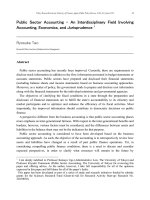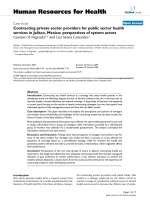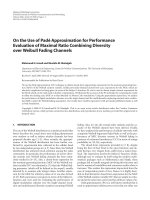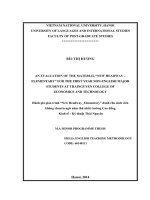Building the criteria of performance evaluation for public sector employees: The case of college of economics lecturers Can Tho university
Bạn đang xem bản rút gọn của tài liệu. Xem và tải ngay bản đầy đủ của tài liệu tại đây (277.94 KB, 9 trang )
AGU International Journal of Sciences – 2019, Vol. 7 (2), 12 – 20
BUILDING THE CRITERIA OF PERFORMANCE EVALUATION FOR PUBLIC
SECTOR EMPLOYEES: THE CASE OF COLLEGE OF ECONOMICS LECTURERS
CAN THO UNIVERSITY
Nguyen Thi Phuong Dung1, Le Thi Thu Trang1
1
Can Tho University
Information:
Received: 16/07/2018
Accepted: 07/07/2018
Published: 11/2019
Keywords:
Performance evaluation,
public sector, lecturer
ABSTRACT
The research presents the criteria for performance evaluation to public
sector employees: the case of College of Economic (CE), at Can Tho
University, Vietnam. This is an important basis to recognize, to consider
rewards to qualified staff in an academic year according to Decree
56/2015/ND-CP dated 09/6/2015 of Government. This study applied case
study method. The result of the research presents four sections: (1) Work
performance according to the responsibilities in the contract; (2)
Performance according to occupation ethic; (3) Spirit of responsibility to
serve the country, to cooperate with colleagues and the awareness of
officials’ behavior disciplines; and (4) Performance of officials’ other duties.
Four sections are divided into 13 criteria. Besides, the research results are
not only crucial basis for salary, but also the references for organizations.
1. INTRODUCTION
the amendments in performance evaluation are in
Decree No. 39/2012/ND-CP supplementing
Decree No 42/2010/ND-CP on the law of
emulation and commendation; Decree No.
65/2014/ND-CP amending the law on emulation
and commendation in 2013; and most recently,
Decree No. 56/2015/ND-CP of the Government
on assessing and classifying cadres, civil servants
and public employees and Circular No.
35/2015/TT-BGDĐT guiding the education
sector’s emulation. Despite many amendments,
the implementation and concretization of these
decrees and circulars are still too qualitative for
evaluation criteria in public sector
Performance evaluation is one of the topics that
the managers are interested in because it can help
to make decisions for retention, promotion, tenure
and salary increases. The lack of fairness and
transparency in the evaluation process will impact
employees’ enthusiasm at work workers, which
results in low productivity. Performance
evaluation scientifically is that all criteria must be
measured and determined by the critical figures of
key contents for each task. Assessing the
performance of cadres, civil servants and officials
is an important step that has been paid attention
by the Government and has been repeatedly
revised in order to improve the efficiency of the
assessment process in public sector units. Some of
In the private sector, the performance evaluation
is measured based on the profit or target sales
12
AGU International Journal of Sciences – 2019, Vol. 7 (2), 12 – 20
which determine the basic salary, bonus, ... of an
individual. However, in the public sector, this
activity has not been effectively implemented
because of respectable mindset. This leads to the
liability for the work that was psychologically
affected, “foot in, foot out” alike. This is the
reason why many officials become unwilling to
work or feel like lack of enthusiasm. Therefore,
using KPIs to assess implementation process of
cadres, civil servants and public employees is a
suitable way for performance evaluation.
Therefore, in the academic year 2015-2016, Can
Tho University in general and College of
Economics in particular changed the form and
proportion of evaluation criteria compared to the
previous periods. However, the innovation was
not been effectively carried out because the
evaluation criteria were still very general for
example "Completing the assigned tasks,
achieving productivity and quality, etc.". In
particular, it is essential that the managers access
their officials fairly by quantifying and
concretizing the indicators above. Consequently,
the study on “Building the criteria of performance
evaluation for public sector employees: the case
of College of Economics Lecturers at Can Tho
University” is a need.
2. OBJECTIVE
METHOD
AND
work plan. The qualitative analysis method was
used specifically in-depth interviews with officials
in the College of Economics of Can Tho
University. Interviews at the College are
conducted on people who are believed to be
knowledgeable in the field of investigation. The
interviewees’ work position at CE are various
such as Dean, Deputy Dean, Head of specialized
departments,
representatives
of
lecturers
according to their seniority (young lecturers,
lecturers working for 10 years and longer). In
order to provide a complete set of criteria, in
addition to questionnaires sent to the consulted
subjects in the referendum, the research also held
a meeting to interview the college leaders. In
some cases, the study conducted a second and
third interview with leaders to clarify the
evaluation criteria because the successful
application of KPI method must be approved by
the leadership board. For the rest of the study
reference, supplements and responds to
information directly related to the work performed
by the college staff and lectures. The open
questionnaire was built based on the form No. 03
in the Decree No. 56/2015 / NDCP on the content
for assessing and classifying officials, public
servants and officials. After summarizing ideas,
the researchers formulated a set of evaluation
criteria. The study also took 3 more simultaneous
interviews with college leaders to build criteria
consistent with the goals of the unit.
RESEARCH
2.1 Objectives of the research
The main objective of this research is to build a
system of performance evaluation criteria for the
lecturers of CE at the Can Tho university. Using
KPI- based evaluation aims to measure the
capacity of the individuals/ units in order to create
the basis for consideration of emulation and
commendation, salary distribution, additional
income, appointment, alternation, officials
discipline.
3. THE EVALUATION CRITERIA
Lecturer evaluation criteria is one of the most
important criteria to assess the quality of
university’s education and training. However, it is
necessary to propose the evaluation criteria which
must be based on the regulations and guidelines in
the field of education. Besides, the selection of
methods and assessment tools must be available .
Many managers believe that the employees’
capacity evaluation will produce positive
motivation for employees. This is a crucial
content not only in reviewing their responsibilities
2.2 Data analysis
The method for building a set of criteria for
evaluating lecturers at the College of Economics
(CE) - Can Tho University is based on the lecturer
13
AGU International Journal of Sciences – 2019, Vol. 7 (2), 12 – 20
but also in their performance of employees in both
private and public sector.
guiding students to the newest research findings
and debates in their field of study. Teaching must
be combined with scientific research activities.
There cannot be a good lecturer who does not
participate in scientific research.
According to Decree 56/2015 / ND-CP on
assessing and distributing officials, lecture
evaluation is conducted according to 04 criteria
including (1) results of work performance or
duties under the contract work; (2) the compliance
of lecturers' ethics; (3) the responsibility, attitude,
cooperating with colleagues and implement codes
of behaviors; (4) the performance of lecturers’
other duties. Besides, Can Tho university operates
its resources to be the leading national institution
for education, research and technology
distribution in order to make significantly
contribute to high-quality human resource
development. According to the mission of Can
Tho university, the lecturers will be evaluated
based on their performance in teaching, scientific
research and social activities according to 04
criteria of Decree 56.
One of the important functions of a lecturer is
teaching. In particular, the criteria for professional
titles of teaching staff are presented in Joint
Circular No. 36/2014/TTLT-BGDĐT-BNV.
Therefore, in order to fully assess the teaching
capabilities of lecturers there should be evaluation
criteria covering all teaching activities. Those
criteria are:
Criterion 1: Regarding the norm of teaching hours
(according to Regulation No. 4412 / QD-CTU
25/11/2015 on promulgation of working
regulations for lecturers at Can Tho University).
Standard of lecture’s working time norm is
established by the titles, qualifications and salary
ratio.
The results of the work performance based on the
four criteria are the basis for reward, salary
increase. According to the experience of public
universities, the criteria of the work performance
or duties under the contract accounts a larger
proportion than the other criteria.
Criterion 2: The feedback from students.
Lecturers and their teaching must also be
evaluated through the feedback of students. At the
end of each semester, students will be interviewed
to evaluate each module of each lecturer. Based
on the faculty board’s collections, the university
has the right solution for the future.
Next, the study illustrated four criteria that were
used to evaluate lecturers of CE at Can Tho
University.
Criterion 3: Based on the work plan and
assignment of the Head of the Departments,
lecturers are responsible for preparing the plan
and the expected volume of their work. The
declaration of lecturers' workload, in addition to
teaching in class, also includes activities such as
preparing subject outlines, preparing new
subjects, updating lectures, proposing, test
designing, exam monitoring, grading, publishing
scores.
3.1 Results of work performance or duties
under the work contract.
3.1.1 Assessing Teaching
One of the most important functions of a
university is to convey knowledge. This function
cannot be assessed separately with the scientific
research. A good lecturer should be the one to
stimulate student’s curiosity in learning by
14
AGU International Journal of Sciences – 2019, Vol. 7 (2), 12 – 20
Table 1. Criteria for evaluating lecturer's teaching - Criterion Item 1
Criterion
1
Contents
Complete from 110% of standard working hours directly in class (excluding
professional activities converted into standard hours)
Complete from 90% to less than 110% of standard working hours directly in class
(excluding the professional activities converted into standard hours)
Complete from 50% to less than 90% of standard working hours directly in class
excluding professional activities converted into standard hours).
Score from student's feedback is from 3.6 and higher.
2
Score from student's feedback is from 3.2 up to 3.6.
Score from student's feedback is below 3.2
Developing, revising course syllabus
Developing satisfactory new lesson content
3
Updating satisfactory content of lectures
Completing the scoring plan on the system on time
Completing the scoring plan on the system on time
Submitting general scores, instructions on schedule, without being reminded
(Source: Processing of survey results, 2018)
3.1.2 Assessing Scientific research
levels and international scales. The criterion
covers the whole personnel body including the
heads and members; Chairman / member whose
articles are published in the domestic scientific
journals according to the State Council of
Professor Title recognized in 2016; whose English
articles are published in domestic and foreign
magazines; whose scientific seminars are
published by domestic or international
organizations.
Besides teaching function, the evaluation also
involves evaluating lecturers’ scientific research
duty. Effective teaching needs to combining with
scientific research activities.
Criterion 4: Scientific research works. In order to
encourage lecturers to participate in scientific
research, especially in this field where there are
not many staff involved in, the College of
Economics and the university has incentive
policies such as adding teaching hours, building
criteria for rewarding and adding time for female
lecturers. (Regulations 4412 and 2015).
Therefore, this criterion is based on the approved
scientific research proposals from institutional
level to local area, province, ministry, national
Criterion 5: Supervising students to conduct
scientific research topics. This is the criterion for
evaluating lecturers regarding scientific research.
A good lecturer not only imparts knowledge but
also helps students develop problem-solving and
analytical skills.
15
AGU International Journal of Sciences – 2019, Vol. 7 (2), 12 – 20
Table 2. KPI for research activities
Criterion
Contents
Writing research proposals
Leading and managing the units, getting certificates of merit at university level or higher
Members to implement the project at the university; local / ministry; province / domestic;
international level
4
Authors / Co-authors whose articles are published in national scientific journal by Council of
State; the title of professor is recognized
Author / Co-Authors whose English articles are published in national / international journals are
not in the list
Author / Co-Authors whose English articles are published in international journals in Scopus
Articles in scientific conference published nationally / internationally
Guiding students to register research topics
5
Guiding students to complete scientific research topics at accepted levels
(Source: Processing of survey results, 2018)
3.2 Assessing the compliance of lecturers'
ethics
students to follow. This criterion is based on
Decree No No. 16/2008/QD-BGDDT dated April,
16, 2008 - Ethics regulations of the Minister of
Education and Training, and Decree No 79-QD/
ĐU 31/5/2012 - Standard regulations of
lecturers’s ethics of Can Tho University following
Ho Chi Minh's moral example.
The regulation of lecturers' ethics is a necessary
standard for lecturers who not only make efforts
to train themselves but also deserve social respect.
It is one of the basis for evaluating, categorizing
and supervising lecturers to build a qualified
workforce as well as to improve teaching skills
and methods, with a positive lifestyle and
standard behavior that really is an example for
The 6th criterion is built on professional ethics
consist of qualities, ethics, lifestyles, preservation
and protection of lecturers' ethics.
Table 3. Assessing of the compliance of lecturers' ethics
Criterion
Item
No complaints, disciplinary actions recorded by council from reprimand upwards
No slandering, distorting, over-level complaints, causing disunity
6
No complaints from the family that impact the unit
No violating traffic laws
No violating laws or regulations not to impact the overall achievement of the unit,
disciplinary actions from reprimand upwards
16
AGU International Journal of Sciences – 2019, Vol. 7 (2), 12 – 20
Criterion
Item
Attending short-term training courses, conferences, seminars, ... to improve the
qualification with a certificate
Attending all meetings for Resolution, politics, professional skills (seminar) organized by
Faculty, University
Finding scholarships themselves to study Master, PhD successfully
Finishing Master/Doctor programs on schedule
Appointed as PGS/GS; awarded certificates by the Minister (Outstanding Educator/
People’s Educators)
Being upgraded lecturers at all levels of the year
(Source: Processing of survey results, 2018)
3.3 Assessing of the responsibility, attitude,
cooperating with colleagues and implement
codes of conduct
16/2008/QD-BGDDT April 16, 2008 and Decree
No 79-QD/ĐU 31/5/2012 – to give evaluation
criteria for this item.
Based on Decree No 1501/QD-TTg, 2015 Approving the project on strengthening
revolutionary, ethical and lifestyle ideal education
for young and teenagers, in the period 20152020.The sense of responsibility, the attitude of
serving is related to enhancing revolutionary
ideals, ethics, and student life in order to change
in morality and comprehensive development.
Besides, it is also based on Decree No
Criterion 7: There is a sense of responsibility in
the job and serious practice with internal rules and
regulations.
Criterion 8: Having a polite attitude, proper
gentleness, attentive to service, listen to opinions,
and do not make difficulties for students.
Criterion 9: Spirit of cooperation with colleagues
to solve the job in the organization and
cooperation with other units.
Table 4. Assessing the responsibility, attitude, cooperating with colleagues and implement codes of conduct
Criterion
Item
Having a sense of responsibility in the teaching of the modules
Not missing teaching hours without complaints from students
7
Teaching on time and full time without complaints from students
Not having outside lecturers for backup teaching
Appropriate words and behaviors to students
8
Assisting students to look for scholarship opportunities recognized by the Faculty
Having initiatives and scientific research products which are applied in practice
recognized by the Faculty
9
Proposing ideas to attract successful short-term training courses
Taking responsible for/ Engaging in the procedures and proposing useful strategies
recognized by the Faculty
17
AGU International Journal of Sciences – 2019, Vol. 7 (2), 12 – 20
Criterion
Item
Effective cooperation with colleagues, being honest with supervisors
Not being indifferent or late, which affects the work schedule criticized by leadership
board
Introducing Master / PhD scholarships to colleagues recognized by the Faculty
Taking responsibility for/Engaging in organizing scientific conferences, seminars, jobs,
training events, etc.
(Source: Processing of survey results, 2018)
3.4 Assessing the performance of lecturers’
other duties
curriculum development, organizing seminar, and
professional improvement activities.
Other duties are activities which lecturers attend
in the unions and social works in the College and
University. According to Decree No 4412/2015, if
lecturers are holding leadership, managerial or
unions positions, the proportions of standard
working hours are different. Therefore, it is not
the mandatory task of the lecturers. Not all
lecturers are in charge of such activities. It is just
a criterion for evaluating, classify lecturers and
considering lecturers' rewards.
Criterion 11: Faculty tasks: these jobs are related
to the faculties' activities including organizing
activities, attending seminars, conferences, and
others recognized by the Faculty.
Criterion 12: Union task: these activities are
related to organizing and attending in students'
and staff’s games organized by Youth Union.
Criterion 13: Social service: attending in different
levels in the university/society to sharing
scientific knowledge to the community such as
advice for community /social/ business education
programs.
Criterion 10: Besides Teaching and research
duties, lecturers also attend in extra-curricular
activities depending on annual plans such as
Table 5. Assessing the performance of lecturers’ other duties
Criteria
Contents
Author/Co-author in published books
Author/Co-author in reprinted books
10
Scholarships Awardee for Master, PhD study
Presenter at Faculty-level Seminar
Guiding lecturers to complete the probationary
Engaging in the AUN standard test of the Faculty
Engaging in adjusting training programs
11
Engaging in improving training programs
Presiding / joining the training program quality evaluation team
Presiding / joining project proposals of all levels recognized by the Faculty
18
AGU International Journal of Sciences – 2019, Vol. 7 (2), 12 – 20
Criteria
Contents
Self-finding and winning domestic/international projects recognized by the Faculty
Participating in students’ employment survey after graduation
Other activities in addition to teaching
Presiding / engaging in organizing sports events and arts festival
Presiding / engaging in organizing arts activities for students
Presiding/ engaging in consulting to organize contests, academic classes for students
12
Executive Committee members of Youth Union Faculty / University
Participating in the Sports Festival, organized by Faculty
An enthusiastic supporter in movements organized by the University/Faculty (01 time)
Participating in launching the movements of University/Faculty
Engaging in counseling for organizations large / medium / small scale
13
Engaging in teaching short-training courses of the Faculty
Finding enterprises attend in supporting teaching activities
(Source: Processing of survey results, 2018)
4. CONCLUSION
concrete evidence that helps lecturers know how
their work contributes to the university’s
development goals. Although the indicators are
quantified and easy to measure, leaders need to
specify the score for each indicator and determine
key to adapt to organizations’ development goal.
As the quality of education is increasingly
concerned by the society, it is required the
university improve the quality of training and
make adjustments to achieve those goals more
effectively. Particularly, competency of the
teaching staff is the key factor. Therefore, the
quality of lecturers is paid much attention by the
university and many policies are proposed to
promote working motivation and opportunities for
lecturers. Even though these efforts brought
successful changes in evaluating the performance
of the public sector agencies, they still face
unprecedented pressure to improve their quality.
This research proposes a set of criteria for
evaluating staff of the College of Economics at
Can Tho University based on the work
performance indicators. The performances of
lecturer are traditionally evaluated according to
three major criteria; teaching, research, and
services. All criteria are specifically quantified on
targets, performance level. The assessment is
REFERENCES
Decree No 42/2010/ND-CP.2010. Decree
detailing a number of law emulation and
reward, law adjusting, supplementing a
number
of
law
emulation
and
reward />rtal/
chinhphu/hethongvanban?class_id
=1&mode=detail&document_id=94226.
Decree No 39/2012/ND-CP. 2012. Decree
adjusting, supplementing a number of content
decision 42/2010/ND-CP of April 15, 2010,
the government detailing a number of law
emulation and reward, law adjusting,
supplementing a number of law emulation and
reward />
AGU International Journal of Sciences – 2019, Vol. 7 (2), 12 – 20
CP-sua-doi-Nghi-dinh-42-2010-ND-CPhuong-dan-Luat-thi-dua-138773.aspx.
tuong-cach-mang-dao-duc-loi-song-thanhthieu-nien-nhi-dong-288584.aspx.
Decree No 65/2014/NĐ-CP. 2014. Decree
detailing a number of law emulation and
reward, law adjusting, supplementing a
number of law emulation and reward in 2013.
van-ban/Bo-mayhanh-chinh/Nghi-dinh-65-2014-ND-CPhuong-dan-Luat-Thi-dua-khen-thuong-namsua-doi-2013-238029.aspx.
Decree No 79-QD/ĐU/DHCT. 2012. Decree
issued regulations on ethical standards of straff
of Can Tho University following Ho Chi
Minh's
moral
example.
/>Quy%E1%BA%BFt+%C4%91%E1%BB%8B
nh+79Q%C4%90%2F%C4%90U%2F%C4%9
0HCT&rlz=1C1CHZL_viVN733VN733&oq=
Quy%E1%BA%BFt+%C4%91%E1%BB%8B
nh+79Q%C4%90%2F%C4%90U%2F%C4%90HCT
&aqs=chrome..69i57.1081j0j9&sourceid=chro
me&ie=UTF-8.
Decree No 56/2015/NĐ-CP. 2015. Decree on
assessment and classification of officer, public
staff
in
public
sector.
https://
thuvienphapluat.vn/van-ban/Bo-may-hanhchinh/Nghi-dinh-56-2015-ND-CP-danh-giava-phan-loai-can-bo-cong-chuc-vien-chuc277514.aspx.
Decree No 4412/QD-DHCT. 2015. Decree on
issuing working regulations for lecturer of Can
Tho University. Can Tho University. pp. 3-9,
/>/vbdh/vbct/20154412 _QD_DHCT.pdf.
Nguyễn Thị Tuyết. 2008. Lecturer evaluation
criteria. Journal of Science Hanoi National
University. Social Sciences and Humanities.
Vol. 24, pp. 131- 135.
Decree No 1425/QD-DHKT-TCHC. 2017. Decree
on issuing standards for evaluating work
performance - Version 2017. Ho Chi Minh
City University of Economics. pp.3-7.
Decree No 1501/QD-TTg. 2015. Decree
Approving the project on strengthening
revolutionary, ethical and lifestyle ideal
education for young people, teenagers and
children
in
the
period
2015-2020.
/>
Decree
No
279/DHSPKT-QTCL.
2014.
Performance evaluation system - KPIs applied
at Ho Chi Minh Technical Education
University, pp.6-10.
20









